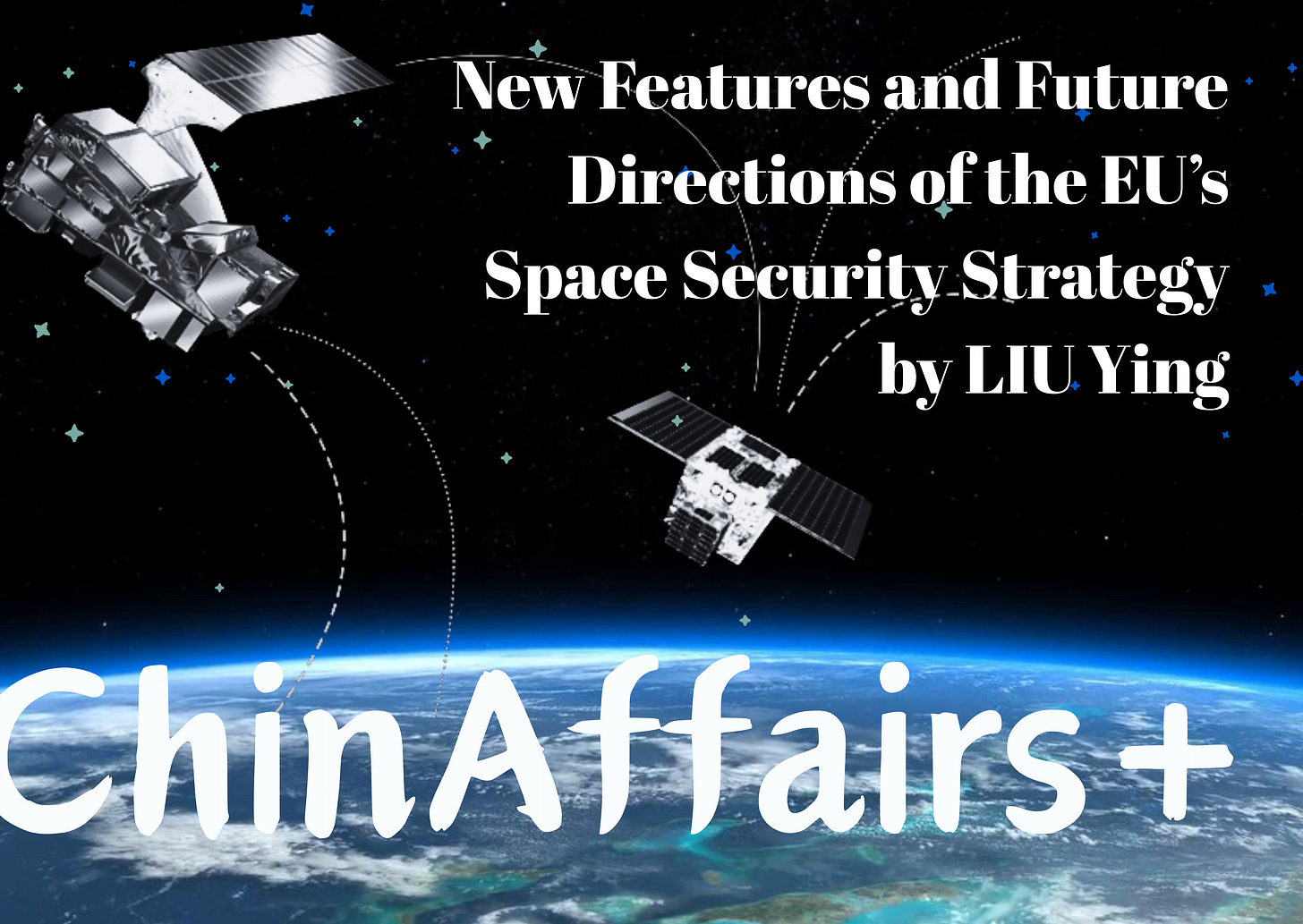New Features and Future Directions of the EU’s Space Security Strategy by LIU Ying
While strengthening the EU’s defense capabilities, EU’s new space strategy may lso escalate military rivalry in space.
Welcome to the 57th edition of our weekly newsletter! I’m SUN Chenghao, a fellow with the Center for International Security and Strategy (CISS) at Tsinghua University, Council Member of The Chinese Association of American Studies and a visiting scholar at the Paul Tsai China Center of Yale Law School (fall 2024).
ChinAffairsplus is a newsletter that shares articles by Chinese academics on topics such as China’s foreign policy, China-U.S. relations, China-Europe relations, and more. This newsletter was co-founded by my research assistant, ZHANG Xueyu, and me.
Through carefully selected Chinese academic articles, we aim to provide you with key insights into the issues that China’s academic and strategic communities are focused on. We will highlight why each article matters and the most important takeaways. Questions and feedback can be addressed to sch0625@gmail.com
Today, we have selected an article written by LiuYing, which focuses on the space security strategy of the EU.
Summary
As outer space becomes a new arena for strategic competition among major powers, it also brings increasingly prominent security threats and governance challenges. To address the militarization of space technologies, overcome the stagnation of space cooperation with Russia due to worsening relations, get rid of defense dependencies, and reverse economic decline, the European Union released its first Space Security Strategy at the end of 2023, followed by a series of new space-related policies and action plans. The new strategy is the first official strategy placing emphasis on the strategic security and defense dimensions of space activities, calling for strategic autonomy in space to strengthen the EU’s hard power in space innovation and its voice in global space governance.
However, the EU’s current institutional framework is inadequate to address growing space security threats. Strategic autonomy in space and internal consensus on space integration remain difficult in the short term. Setbacks in international cooperation may further hinder the strategy’s implementation.
Why it matters
By the end of June 2025, the European Commission had released its first EU Space Act to address the challenges posed by international competition and geopolitical tensions. This is a groundbreaking initiative, marking a paradigm shift in Europe’s space policy. It is clear that the EU currently harbors ambitious aspirations in the space sector, with safety being one of its top priorities in space strategy.
The core reason for selecting this article lies in its distinct Chinese academic perspective and in-depth insights into the EU’s space strategy, which provides key references for understanding European dynamics in the global space competition. This insight is essential for understanding the limits of Europe’s “strategic autonomy” in space, offering readers a realistic foundation for assessing future cooperation or competition with the EU in space governance. For readers concerned with global space competition, European strategic autonomy, and the international security landscape, this article helps penetrate the surface of policies and accurately grasp the core of the EU’s space strategy.
Key points
1. New Features in the Space Security Strategy of the EU
Against the backdrop of an increasingly pronounced trend toward the militarization, weaponization, and battlefieldization of space, security and defense have become the top priorities of the EU’s space policy.
Since the escalation of the Ukraine crisis, the EU has made a series of new strategic arrangements. In November 2023, the Council of the European Union approved its first-ever Space Security Strategy, which officially articulated for the first time the objectives of strategic security and defense in space activities. Guided by this strategic vision, the EU Space Programme has accelerated its development.
(1) Demonstrating the Objectives of Strategic Security and Defense
The new strategy identifies the main threats that the EU faces in developing its space capabilities. The EU holds that anti-space technologies, developed to target space systems, ground-based supporting infrastructure, and the data links connecting the two, could pose damage to the space assets of European countries. As a result, aerospace enterprises and their supply chains will also suffer interference from competitors. Key factors contributing to the accelerated intensification of space security threats include the accelerated upgrading of space technology and equipment, intense competition between major space powers and emerging countries, the growing scarcity of space resources, escalating trends towards space militarization and weaponization, increased risks from space debris, and the accelerated development of anti-space technologies. Furthermore, the new space strategy of the EU also clarifies the predefined space defense objectives set in the early stage. However, the Strategy deliberately avoids addressing the fact that the US and the EU are themselves developing space weapons.
(2) Emphasizing the Enhancement of Strategic Autonomy
In terms of space defense, the EU has gradually recognized that breaking free from dependence on the United States and NATO, achieving complementary advantages, integrating forces within the EU framework, enhancing its space defense capabilities, and striving for rule-making authority are particularly crucial to advancing its common defense.
What’s more, the EU is pursuing strategic autonomy in space technology. Currently, Europe faces competitive pressure from major spacefaring nations and private companies like SpaceX. With its manned spaceflight technology lagging behind countries such as China, the United States, and Russia, the EU needs to secure its technological sovereignty and competitiveness, develop breakthrough technologies, and build satellite constellations. While serving geopolitical and military objectives, this also facilitates responses to global crises like climate change.
(3) Emphasizing the Enhancement of Innovative Capabilities
The “Strategic Compass” initiative of the EU introduces the concept of “hard power in space”, which holds that only through achieving independent innovation in space technology can it meet its stated goals and secure a position in the space competition with hard power. To this end, the EU is shifting the focus of its space strategy toward developing dual-use space assets and technologies, which aim to enhance the EU’s overall defense capabilities while ensuring the applicability of space assets to economic development. The EU will achieve this goal by pursuing innovation and change, increasing support for scientific research, and attracting investment.
(4) Striving for Discourse Power in Space Security Governance
With the increasing number of outer space objects and collision debris, space traffic management has become one of the top priorities in space security governance. The new space strategy of the EU explicitly emphasizes the importance of formulating “traffic rules” for space, which demonstrates the EU’s determination to participate in the formulation of space rules and compete for the right to speak in space governance. At the same time, the EU also stresses that the Ukraine crisis has had many negative impacts on its space projects and space cooperation with Russia. Therefore, it is necessary to strengthen cooperation within member states and at the international level to mitigate adverse factors and enhance their right to speak in space security governance. Overall, the new space strategy of the EU is primarily committed to developing an action roadmap that is short-term, content-specific, and highly feasible.
2. Drivers of Changes in the Space Security Strategy of the EU
(1) Responding to the Trend of the Militarization of Space Technology
Since the beginning of the 21st century, the trend toward the militarization of space technology has become increasingly evident. Many countries have established space forces or specialized agencies for implementing space strategies, striving for dominance in space development and governance. The Ukraine crisis is a direct manifestation of the intensified militarization of space technology, and also the most important driver for the EU in launching its first space security strategy.
The Ukraine crisis has seen space turning into a key means for non-state actors to influence the war, and has also provided a testing ground for new types of military equipment and concepts. The militarization of space technology has not only escalated the Ukraine crisis, but also poses an unprecedented threat to commercial and civilian infrastructure closely linked to military space assets. The new threats arising from the Ukraine crisis have made the EU attach greater significance to defense autonomy.
(2) Overcoming the Dilemma Posed by EU-Russia Tensions
After the outbreak of the Crimean Crisis in 2014, the West imposed comprehensive sanctions on Russia. Aerospace is one of the few fields where Russia has maintained cooperation with the West, and the space cooperation between the two sides has a long history. However, after the escalation of the Ukraine Crisis, the EU imposed upgraded sanctions on Russia. These sanctions have constrained Russia’s space technology development and also impacted the EU’s space projects. With Russia-EU deep space exploration and China-EU manned space programs having come to a halt, the EU has been forced to seek out the United States as a cooperative partner on the one hand, and on the other hand, it is also bound to strengthen its own space capabilities and strategic autonomy in space.
(3) Breaking Free from External Dependence in Defense
The Ukraine crisis has made the EU aware of the urgency of achieving independent defense and freeing itself from reliance on the US, while Trump’s return to power has further intensified European countries’ concerns about the future of the US-Europe defense alliance. The dependence of the EU on the US in defense is especially reflected in the supply of weapons and equipment.
The EU does not rule out cooperation with NATO in space defense. The new space strategy clearly states that the EU needs to protect the space assets it already owns, while NATO mainly relies on the space assets owned by its allies to develop defense capabilities, which is the biggest difference between the two. Therefore, in addressing space threats, the EU and NATO should play complementary roles.
The new space security strategy of the EU recommends that dual-use space assets should serve the space strategy and the independent defense of the EU. Strengthening space situational awareness capabilities is also a key task repeatedly emphasized. Sensor technology is the key to achieving situational awareness capabilities.
(4) Reversing the Economic Slump
The Ukraine crisis has had a profound impact on European economies, which had been hit by the COVID-19 pandemic and fell into a new predicament before they could recover. For the EU, industries that currently contribute to economic recovery are increasingly relying on space technologies such as satellite navigation, earth observation, and network connectivity. To ensure sustained economic development, the EU is bound to attach importance to space security. The new space strategy highlights the important role of space activities in driving economic development and generating positive spillover effects on other industries.
3. The Future Evolution of the EU’s Space Security Strategy
Compared with previous policies, the space security strategy of the EU has a strong military security overtone, highlighting security and defense objectives. This strategy and its associated policies have significant implications for both Europe and the world as a whole. However, from multiple perspectives, the prospects for the strategy’s success are not clear-cut, and its implementation still faces many practical difficulties.
(1) Institutional Structure Falls Short of Addressing Space Security Threats
Currently, the EU is facing diversified threats in the field of space security, including the lack of a unified space defense strategy and the lack of a unified decision-making mechanism. However, multi-agency management and poor coordination in space projects make the EU struggle to reach consensus on even key concepts, which has led to difficulties in achieving consistency, clarity, and coordination in space security governance. Therefore, aligning objectives, unifying decision-making, and bridging differences are issues that must be addressed in the EU’s space integration cooperation.
(2) Multiple Constraints in Achieving Space Strategic Autonomy
Whether viewed from the perspective of the strength gap or technological development, the autonomy of the EU’s space activities may not be quickly achieved. First, in terms of technology, the EU is still unable to fully rely on its own strength to compete on an equal footing with other major space powers. Second, for space security governance, the EU still needs to cooperate with other states, including the United States.
Third, the uncertainty in external situations affects the implementation of the EU’s space autonomy strategy.
(3) Struggles to Reach Internal Consensus
The new strategy of the EU aims for all member states to reach a consensus on space security threats. However, against the backdrop of the slow progress of Europe’s common defense process, the integration of space-related consensus will also be difficult to achieve. First, it will be hard for all EU member states to reach an agreement on space policies in the short term. Second, due to significant variations in their levels of space capabilities, security interests and demands, and policy priorities, it remains difficult for EU member states to reach a consensus on space defense internally. Third, in the absence of a unified space law, the implementation of the new strategy will also face significant obstacles.
(4) Undermining of Strategic Implementation by Hampered International Cooperation
Under the impact of the COVID-19 pandemic, the Ukraine crisis, and the resulting economic recession, European space cooperation projects with Russia, China, and other countries have been severely disrupted. Implementing a new space strategy requires greater support in terms of funding, resources, and technological cooperation. However, these conditions cannot all be fulfilled in the short term amid the current setbacks in globalization.
On the one hand, the EU emphasizes the autonomy of its space activities and the importance of space technology for economic development and national defense, while repeatedly rolling out ambitious plans. On the other hand, it finds it hard to break free from its dependence on the US. Furthermore, constrained by factors such as sanctions and pressure from the US, the EU has been unable to continue cooperation with China and Russia in the aerospace field, which has hindered its own development. This strategic paradox will exert a profound impact on the formulation of Europe’s space policies and the implementation of its plans for a certain period of time.
Conclusion
Since the escalation of the Ukraine crisis, the series of space policies and action plans successively launched by the EU have formed the EU’s space security strategic framework, which reflects the new trend of intensifying international competition in space: space capabilities have become a decisive force in shaping the pattern of international relations. Over the past decade, space exploration has witnessed a surge in the number of spacecraft launches, increased participation of non-governmental enterprises, and active manned deep-space exploration projects. However, “space colonization” may also further exacerbate existing power inequalities and imbalances in geopolitics. Currently, the biggest challenges faced by space development include certain major powers seeking hegemony in space by accelerating the research, development and deployment of offensive space weapons and building space military alliances. These factors have significantly increased the risks of military miscalculations and conflicts. The new strategy of the EU reflects these trends and, at the same time, responds to new challenges at the strategic level.
Nevertheless, enhancing the strategic security attribute of space policies is a double-edged sword. While strengthening the EU’s defense capabilities, it may also escalate the military game in space. From the perspective of space security governance, only by formulating an effective new governance framework, promoting technological innovation and cooperation can such risks be effectively mitigated.
About the Author
Liu Ying刘莹:Dr. Liu Ying is an associate professor of the Institute of International Relations, China Foreign Affairs University. She is the author of The National Ideology of Vladimir Putin and The Transition Process in Russia. Her current research projects concentrate on China-Russian relations, comparative studies on China and Russia, and China-US-Russia triangular relations.
About the Publication
The Chinese version of this article was published in International Studies(《国际问题研究》). The journal, launched in May 1959 by the China Institute of International Studies (CIIS) and affiliated with the Ministry of Foreign Affairs, is one of China’s earliest academic journals focused on international affairs. Its creation was supported by key Chinese leaders, including Zhang Wentian, who advocated for a platform to publish research on global issues. The journal’s title was personally inscribed by Vice Premier Chen Yi.










